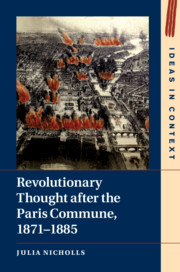Book contents
- Revolutionary Thought after the Paris Commune, 1871–1885
- Ideas in Context
- Revolutionary Thought after the Paris Commune, 1871–1885
- Copyright page
- Contents
- Acknowledgements
- Introduction
- Part I The Paris Commune and Accounting for Failure
- Part II Revolution and the Republic
- Part III Marx, Marxism, and International Socialism
- Chapter 5 Texts in Translation
- Chapter 6 The Origins of Marxism in Modern France
- Part IV Empire and Internationalism
- Conclusion
- Bibliography
- Index
- Ideas in Context
Chapter 5 - Texts in Translation
from Part III - Marx, Marxism, and International Socialism
Published online by Cambridge University Press: 12 July 2019
- Revolutionary Thought after the Paris Commune, 1871–1885
- Ideas in Context
- Revolutionary Thought after the Paris Commune, 1871–1885
- Copyright page
- Contents
- Acknowledgements
- Introduction
- Part I The Paris Commune and Accounting for Failure
- Part II Revolution and the Republic
- Part III Marx, Marxism, and International Socialism
- Chapter 5 Texts in Translation
- Chapter 6 The Origins of Marxism in Modern France
- Part IV Empire and Internationalism
- Conclusion
- Bibliography
- Index
- Ideas in Context
Summary
This chapter examines Marx’s involvement in French socialist thought and action. Contrary to the standard view, Marx’s ideas were widely available in France at this time through a series of translations that appeared from 1872. These translations presented a ‘French Marx’ that was subtly, but noticeably, different from the German original and other versions, and whose ideas were more finely attuned to French circumstances. The construction of this French Marx was overseen and encouraged by Marx himself, who in translation was often willing to sacrifice the ‘purity’ of his ideas in order to broaden their appeal. The chapter contrasts this with his rigidity in the First International – where most French socialists met Marx for the first time, and which forms the basis for most studies of French Marxism – and argues that historians must combine the two. In order to fully understand why ideas such as Marxism spread, we must supplement the social and organisational histories of international socialism with attentive studies of its ideas, its texts, and their dissemination.
Keywords
- Type
- Chapter
- Information
- Revolutionary Thought after the Paris Commune, 1871–1885 , pp. 149 - 178Publisher: Cambridge University PressPrint publication year: 2019

